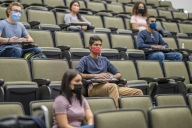You have /5 articles left.
Sign up for a free account or log in.
What started as a nasty quarrel three years ago has blossomed into an apparently blissful relationship. The Texas State Technical College System and the Texas Faculty Association are putting the finishing touches on a dispute resolution system that is aimed at ensuring peace between professors and administrators and that will likely head off potential lawsuits.
TSTC is Texas’s only state-supported system of technical colleges and has four accredited colleges. TFA formed in 1985 to protect faculty rights (the State of Texas does not allow public employees to unionize) and has 1,500 members.
Both sides agree that the issue has been been a long time coming, but that the result has been well worth the effort. “It’s taken longer than I thought to get where we are today," said Charles Zucker, executive director of the faculty association. "Now it looks like we are moving forward and everyone is pleased.”
Three years ago, the feelings on both sides were not quite so pleasant. In May 2003, three instructors at Texas State Technical College campuses, who had been organizing on behalf of the faculty group, did not have their yearly contracts renewed. One filed a lawsuit, and Zucker said that the other two were itching to sue as well. Instead, the college system and the faculty association contacted the Federal Mediation and Conciliation Service.
“You think of them doing the baseball strikes,” said Zucker. But after a daylong meeting, Zucker said that both sides hammered out a resolution over the three instructors. And with further guidance from the federal service, they moved on to set up a formal policy for handling any future clashes.
As both sides envision the process the new procedure for handling disputes will have three major components:
- Non-binding mediation as soon as possible. To comply, the technical college system is sending people for mediation training.
- Creation of a grievance committee. Currently, instructors can appeal only up the chain of supervisors.
- Formation of a procedure to guard against retaliation against grievants.
“We’ve matured to a point where we are taking steps to open ourselves up to different perspectives,” said Jonathan Hoekstra, the vice chancellor for strategic initiatives at the Texas State Technical Colleges system. “We weren’t quite there three years ago.”
Hoekstra said that he will probably serve as an ombudsman of sorts for faculty issues, investigating disputes and responding when appropriate. Faculty will still have the option to seek outside mediation, but Hoekstra feels that becoming more personally involved will allow him to start tracking problems and potentially settle them before they escalate.
“I think it’s going to allow our faculty to be more empowered, innovative and creative,” he said.
“What makes this somewhat unique is that it’s taking place in a state that does not have collective bargaining,” said Zucker. “And we’re engaging in this cooperatively so everyone is a winner.”








